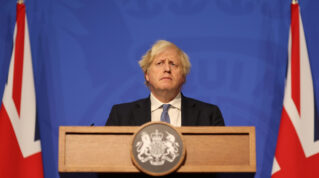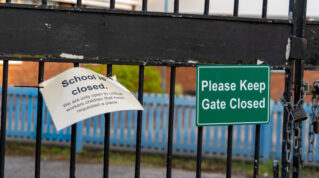The pandemic has fuelled an unlikely turnaround in maintained school budgets, with a record decline in schools in financial trouble over the past year.
Lower energy, exam and training costs have generated savings amid site closures and cancelled tests, helping offset extra staffing, cleaning and other Covid costs – despite repeated calls for extra funding.
But the official figures, published on Friday, show the pandemic has had a conflicting impact on budgets over the past year.
While schools have enjoyed huge savings in some areas of spending, costs have soared in others, and certain income streams have been wiped out.
However, analysis by the Department for Education suggests the overall financial health of the maintained school sector has improved.
The number of schools in deficit – spending more than their annual income – fell from 1,575 in early 2020 to 1,059 in early 2021, a five-year low.
It marks the biggest yearly decline since records began in 2003. Some schools may have become academies and moved out of scope of the analysis rather than moved into surplus, however.
The proportion of schools in deficit fell from 12 per cent in 2019-20 to 8.4 per cent last year.
But the report highlighted “substantial variation” across the country in the number of schools in financial trouble. Schools Week analysis shows seven council areas had every single maintained secondary school in deficit, while 67 had none.
The data, based on local authority data for the financial year between April 2020 and March 2021, shows their total spending on schools rose 3 per cent to £27.4 billion. This is despite maintained school numbers falling as hundreds academised.
School income per pupil increased at primary and secondary level, and in special schools and pupil referral units.
Maintained schools recorded a net £2.03 billion in spare cash at the end of March. The combined surplus marks a £574.5 million increase on the previous year.
The typical maintained school ended the year with £160,490 more than it spent in 2020-21, up 45 per cent or £49,800 on the previous year’s surplus.
The DfE’s analysis suggests income was similar in 2020-21 to the previous year, but spending declined as Covid forced partial site closures and cancelled activities.
“During this time, schools reduced their spend on areas such as supply staff and supplies, and they may also have held back planned expenditure on maintenance.”
School spending dropped sharply on staff development and training (-37 per cent), learning resources (-33 per cent), supply staff (-28 per cent), exam fees and catering (both -24 per cent), energy (-14 per cent), water and sewage (-12 per cent).
However, school spending on ICT leapt by 16 per cent as learning moved online.
And self-generated income halved, falling by £1.1 billion as catering and lettings revenue collapsed.
The DfE noted that “although they have also lost self generated income such as that from lettings and catering, this is generally lower than the amount saved, therefore increasing their revenue reserve.”
Kevin Courtney, joint general secretary of the National Education Union, acknowledged earlier this week schools had been “able to make one-off savings,” but said finances remained “challenging”.
NEU analysis of the same data published on Thursday showed school income remained lower than 2015-16 levels, and spending on special schools continued to fall.
It also noted significant regional divides in deficit levels, and said cuts to per-pupil income were highest in deprived areas.
Such cuts are “disgraceful and in direct contradiction to stated Government policy to level up England,” Courtney added.















Your thoughts